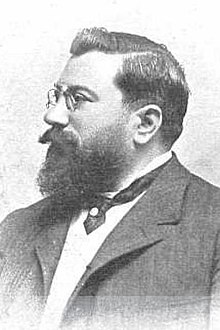Juan Vázquez de Mella
| Juan Vázquez de Mella | |
|---|---|
 |
|
| Born |
Juan Vázquez de Mella y Fanjul 1862 Cangas de Onís |
| Died | 1928 Madrid |
| Nationality | Spanish |
| Occupation | editor |
| Known for | politician, theorist |
| Political party | Carlism |
Juan Vázquez de Mella y Fanjul (1861-1928) was a Spanish politician and a political theorist. He is counted among the greatest Traditionalist thinkers, at times considered the finest author of Spanish Traditionalism of all time. A politician active within Carlism, he served as a longtime Cortes deputy and one of the party leaders. He championed an own political strategy, known as Mellismo, which led to secession and formation of a separate grouping.
Juan Antonio María Casto Francisco de Sales Vázquez de Mella y Fanjul was descendant to an old, though not particularly distinguished Galician family; its best known representative was a 15th-century-cardinal of Zamora. There were mostly military men among Juan's ancestors along the paternal line, related to various towns in Galicia; military were also his grandfather, Andrés Vázquez de Mella, a native of , and his father, Juan Antonio Vázquez de Mella y Várela (died 1874), born in Boimorto. The latter, rising to , proved a rather restless figure and by some was described as exaltado. The man of clear Liberal convictions, for supporting the Espartero coups he was fired from the post of administrador de aduanas in 1840 and imprisoned in 1843. Soon restored to previous post in Lugo, in 1848 he was promoted to intendente provincial in Oviedo, the same year posted to Seville and later to Malaga. In the late 1850s transferred to Covadonga, he resigned from the army in 1860, once his application to join the troops fighting in Morocco had been rejected. Active in the local Liberal realm, allegedly he declared the republic in Cangas in 1873; his son later denied that he had been a Republican.
Juan Antonio married Teresa Fanjul Blanco (died 1893), a native of Amieva and descendant to a locally recognized family; her father ran a commerce and tanning business. The couple settled in Cangas and had only one child. After death of her husband, the widow was first assisted by her brother, who inherited the family enterprises; following differences with her sibling she moved to live with her cousins in Galicia, where Juan spent his childhood. It seems that he identified himself with Galicia rather than with Asturias. According to opponents he was "born into opulence"; he rather admitted "en las perspectivas de la opulencia", which failed to materialize following death of his father; according to some, he spent most of his life bordering poverty and actually died in poverty.
...
Wikipedia
